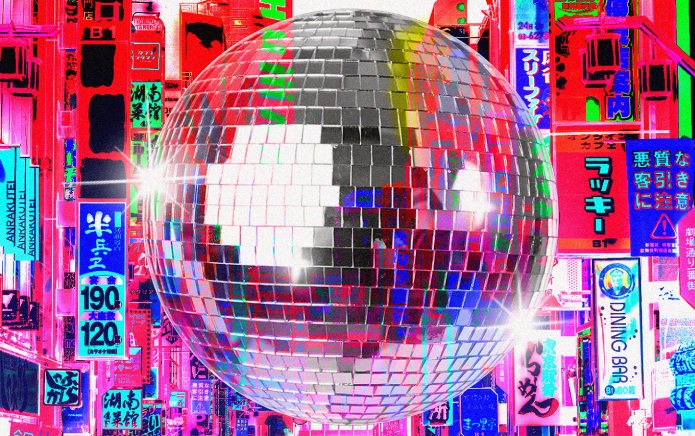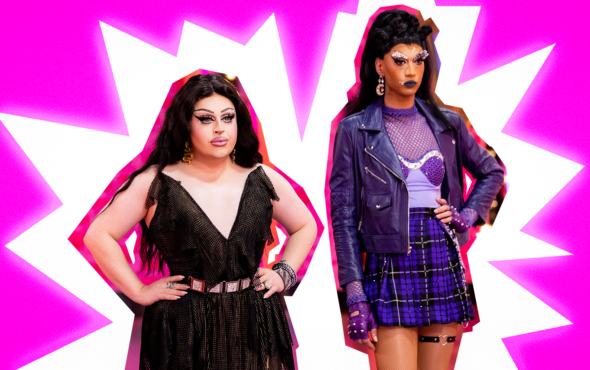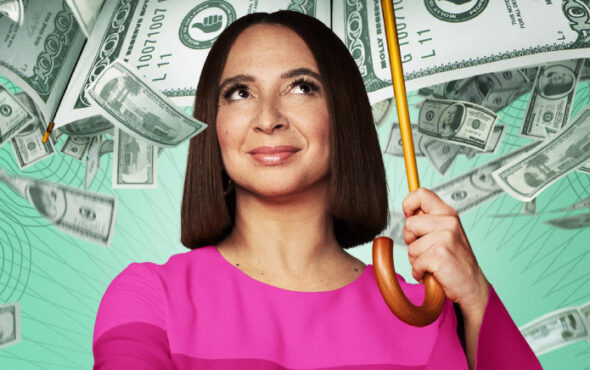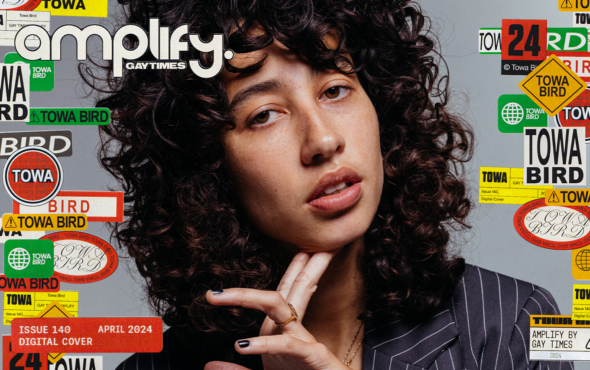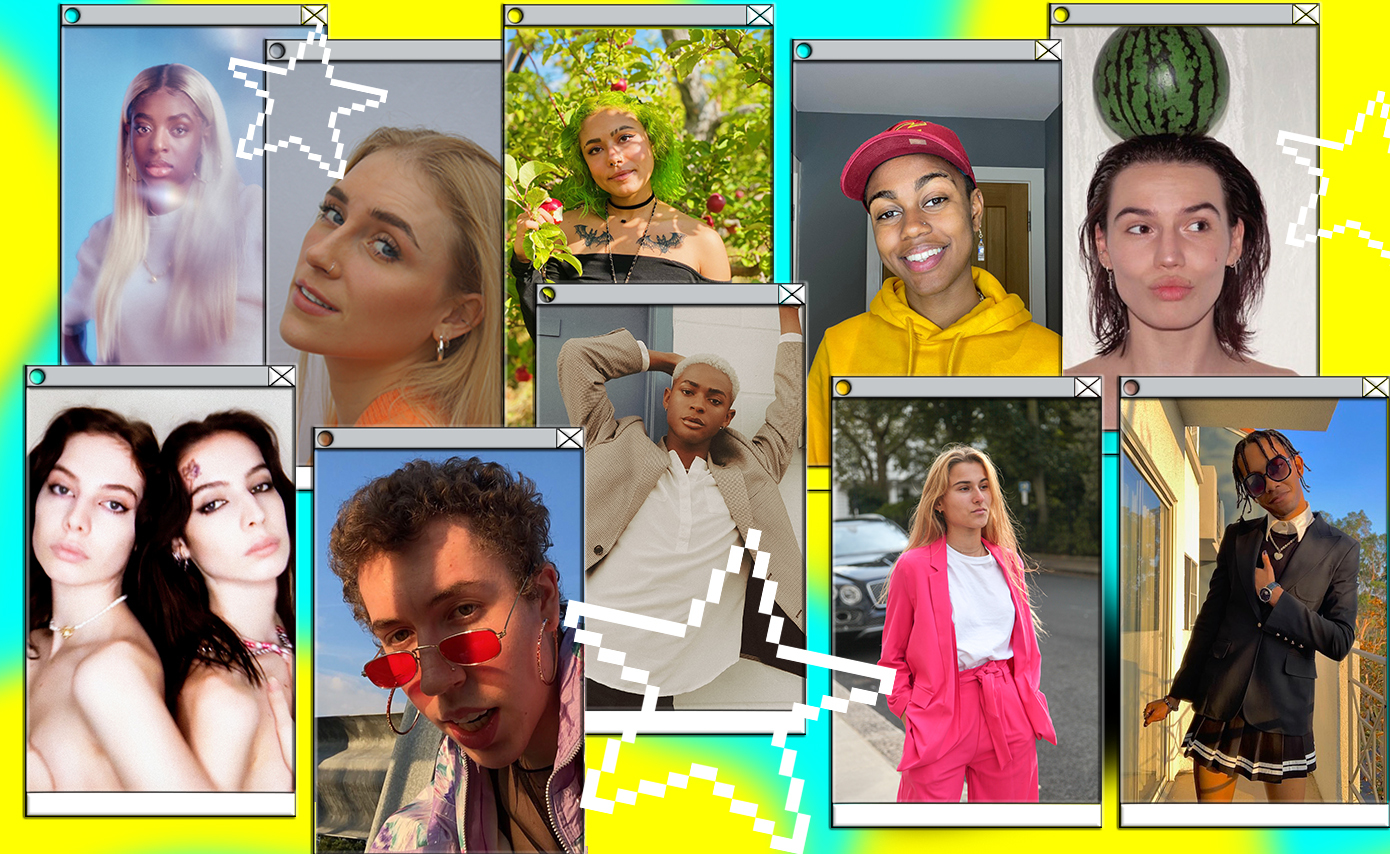
Run by teens and trendsetters, queer TikTok has become a space like no other. A quick glance into the realm of thirst traps, Lady Gaga lip syncs, and plaid adorned wardrobe challenges prove that the younger generation is creating their own rules. Too often TikTok is written off and reduced to nothing more than an app for cringeworthy frat boys to debut their dance moves, but this platform has evolved into so much more. Now, TikTok has transformed into a place of education and self-discovery helping to reclaim the queer experience online.
Sir Carter is a 19-year-old actor, musician and model. He downloaded TikTok after moving to Washington and found it was a place where he could authentically be himself. Sat in his minimalist bedroom, the influencer explained how self-expression is vital to him. “I live in a very small town in Washington State, so being the only openly gay African American person got very lonely. I felt very alienated, so I downloaded Tik Tok as a form of self-expression and it turned into something much bigger,” he tells GAY TIMES. “TikTok definitely allowed me to open up on a broader scale and really connected me with people that I’ve met on the internet. When I joined, I saw this demand for LGBTQ+ creators and I wanted to do something productive. It’s just so crazy, because I get direct messages saying my stories have allowed viewers to feel more comfortable.”
“I honestly had no idea and I really didn’t really think I was going to make this a career, but people really resonate with my videos,” he elaborated. “My first story was about my first guy crush and how I was freaking out, so I kept doing storytimes videos. I think younger LGBTQ+ members resonate with my experiences and can learn from them as well. I did that for a long time and that’s when I saw my numbers increase.”
Sir Carter also wants to be a big proponent of change. “There are so many individuals on TikTok in the younger demographic, so big creators should take accountability to shape where we’re going as a community. What I like to do, especially within my storytimes videos, is think about a time that relates to the political climate and explain it in a way that’s entertaining, but so there’s still a message encoded that they can take away. I want to post videos that relate that can inspire change. So, with the Black Lives Matter movement, I told the story of how I was racially profiled at my local grocery store and it did very well. It allowed my audience to react to what was happening and it opened up a whole new narrative for everyone.”
The future of TikTok is something Sir Carter has taken time to mull over. “I think it’s going to be beautiful. I’m very excited for more people to hop on LGBTQ+ queer TikTok,” he says. “My platform gave me confidence in my voice and I now have 2.5 million people that do relate to my stories and want to listen to me. I started off on LGBTQ+ topics but the Black Lives Matter movement has been a big focal point. TikTok is a community that’s going to become more diverse and I’m very excited for that day. The more voices and standpoints we have the better. You learn something new every day and I’m looking forward to it.”
Tara McKibben, 23, lives in Northern Ireland and downloaded TikTok simply because she had nothing else to do. “I was really bored! It was mid-lockdown and my friends and I were talking about it,” she laughs. “I had this perception that TikTok was 17-year-olds doing dances, but the algorithm got me onto queer TikTok and I was absolutely sucked in.”
As a popular creator, Tara fills up a unique space when it comes to representing Northern Ireland and the LGBTQ+ community. “I was so nervous about my first video on bisexuality,” she admits. “It was a weird thing, because there’s a difference between coming out to your family and coming out on the internet. It just seems like a much bigger deal. Once I was openly talking about it, you can see other people can relate and then they tell you about themselves. It normalised a lot of things for me. I’m a lot more open about myself and my sexuality now. I always felt a need to label and explain myself, but TikTok has made me realise that everyone is fucking confused and it’s fine! That’s what I love about it. I can say something and I’m not as afraid of judgement. It’s almost an overwhelming sense that there are so many people out there and you’re not alone.”
When it comes to addressing rights closer to home, Tara accepts it can be a little more difficult. “Gay marriage has only been legal for less than a year. It’s so backwards. My thing on TikTok is that we have Northern Ireland and the Republic of Ireland. There’s The Troubles and I’ve noticed anytime I talk about Northern Ireland, generally, people get up in arms. So, it is definitely a fine line you have to tread. I grew up in Belfast, which is a bit more liberal, but I’ve experienced stigma and homophobia which is not something people talk about as much.”
Aside from coming across the odd Girl In Red-inspired video, Tara agrees that TikTok can be a great education point. “I’ve learned so much on TikTok. I feel stronger in my opinion, stronger in my convictions and in the information that I now have. I definitely think it strengthens younger people’s ability to challenge outdated views,” she explains. While educating audiences is important, Tara confesses one of her biggest moments of self-validation came from a viewer’s comment. “Someone commented saying, ‘You don’t need to sit here and owe an answer to anyone. You don’t need to label yourself and you don’t owe anyone an explanation.’ That really hit me because when I came out as bi, years later, I was questioning myself, so I had this really confusing point. I’ve had people pressure me to define myself and I’ve experienced biphobia, so I constantly felt this need to explain myself. Once someone sent this comment, it was like a lightbulb moment of acceptance.”
If you’ve not heard one of Spencer Hunt’s daily screams, you’re truly missing out. This 19-year-old icon is unapologetically himself and we love it. Although he’s ebullient online, he admits he’s careful in how he presents himself in person. “I find myself to be more introverted in person because I’m gay,” he says over our call. “I get a bit timid because you never know somebody’s reaction to you being gay. After a certain point, you’re switch coding or you have to change the way you sound because it’s kind of like a defence mechanism in case someone’s homophobic. I feel like it’s conditioned for me to be introverted.”
Often adopting a more boisterous persona online, Spencer started off wanting to be an actor but gave TikTok a go after his friends encouraged him. Now, TikTok has become a new means of presenting himself. “TikTok has given me an opportunity to be myself online and I’ve always wanted to try to do makeup and my friends suggested I do it. It’s pushed me enough to express myself in the way that I want to be comfortable in,” he tells GAY TIMES.
As a creator and viewer, education on TikTok has been a big focus point for Spencer. “When Black Lives Matter was extremely prevalent, so many TikTok videos were about the movement and educating other people on how Black lives are oppressed in the United States,” he reflects. “On TikTok, you’re not necessarily allowed to have political advertisements, but I have been educating people on why I’m voting for Joe Biden. So, I feel like TikTok is already an educational ground. It’s not even just with subjects like politics, there’s like witchtok where people talk about their experiences with witchcraft. There’s zodiacs where people talk about astrology, zodiac signs, and spiritual awakenings.”
“These subjects aren’t conventional subjects, but we’re still learning from other people all the time,” he adds. “I feel like TikTok is like a big community with a lot of sub communities within it and people are able to learn from one another. A lot of the things that I know didn’t just come from my education in school, but social media. I didn’t know some topics were sensitive, but TikTok showed me and I was able to learn about ableism and educate myself, so there are a lot of things that I’ve learned just from being on this app.”
Spencer’s hope for TikTok is that it will continue to teach and educate others about important political issues, but offer a real, unfiltered perspective into the queer community. “Tik Tok is already very diverse and I love how there’s a big gay community on TikTok. I feel like gay people have always been on social media, because it’s just an easier way for us to express ourselves without having to fear being judged in public and social media in a way helps us feel more comfortable with ourselves. Being on social media and seeing a positive response to wearing makeup made me think I can do this in public. I feel confident enough to actually go out and wear makeup outside of just my room or with my friends,” he tells me.
“Also, being queer on social media makes people more accepting of the community. There’s this false stigma attached to the queer community that we’re paedophiles or about transgender individuals and the bathrooms they are allowed to use. Being on TikTok takes away the stigma because people see you for who you are,” he outlines. “We’re not these monsters that people make us out to be. We’re human beings just like you. I see TikTok growing and I hope it does, because it’s just more of an educational opportunity for people to see who we really are and what we’re really like.”
Seth Williams, 17, is a high school student living in Los Angeles. Commonly described as a “femboy”, the young creator uses his platform to challenge gender boundaries and express his identity and welcomes any pronoun use. Introducing himself as Nigerian American and non-binary, Seth was unsure on how he would be received on TikTok. “I started using TikTok as a means of self-expression. I didn’t think that my content would be palatable to many viewers — I was surprised to be accepted by such a wide range of people,” he says, before adding, “I normally don’t label myself because non-binary is supposed to be the absence of that and it can feel like another obligation of androgyny.”
At first, TikTok, like many creators, was a place of self-expression for Seth. “I was getting lots of positive messages from young boys saying they felt similarly to me and watching me gave them the confidence to be themselves. It’s been amazing for me to see”. Now, the young creator is more assured of how he wants to use his platform. “I want to be a positive role model and help change this stigma that follows feminine men and non-binary people. I want to raise awareness about our lives, the things that we deal with, and get a positive image of what young queer kids can become,” he outlines.
As TikTok has helped build his own agency and expression, Seth hopes TikTok’s new change in direction is something that will stick around. “There’s been a slew of popular white queer creators that have been canceled for sharing racism, sexual assault, and Islamophobia. I think it’s creating a space where the voices from people of colour are becoming more heard, which is really necessary. A lot of the time, the face of the queer community can be completely white washed. For example, a lot of the contributions to the community, at least in America, have been Black trans women – not just this white male face of the queer community.” Seth also wants his content to help tackle and educate others on prevalent misconceptions around LGBTQ+ people: “I think a lot of queer stereotypes affect people in different groups differently. There’s definitely a lot of intersectionality in the queer community that people might not realise on the surface. We all have different interactions, especially with queerphobia, and experience how these prejudices and conceptions compound one other.”
Madelyn and Margo Whitley are not your everyday twins. In fact, they’re 19-year-old sisters breaking the internet and into the fashion industry. When I get to chat to them, it’s a normal rainy day in Paris. Squeezed into frame, the twins ironically admit they have no idea how to use Zoom despite having made quite a name for themselves on the small screen. Unlike other creators, the Whitley twins had no intentions of becoming “trans icons”, they just wanted to have some fun on TikTok.
“We didn’t want to inspire people. We never wanted a following. We just wanted something fun for the two of us to do,” Madelyn says. “It’s welcomed attention, but we’re just making silly videos and there’s still some part of me thinking ‘I should not be influencing this many people and there’s a lot of eyes on me right now’,” Margo jokes.
For both Madelyn and Margo, the reality of their following is something that hasn’t quite sunk in. Instead, they treat their new platform in as much of an open way as possible. “It never really feels like we’re influencing people, but I’m glad that we are because we’re literally just being ourselves. I didn’t want it to be something where it’s like, ‘Here’s what you should do and here’s how you should be yourself.’ I didn’t want to be one of those motivational pages. It’s just not me,” Madelyn explains.
Similar, to her sister, Margo agrees that they shouldn’t have to exhaust their identities for the sake of education. “I don’t think I would use TikTok as an educational space. I’m so tired of trans girls being ‘trans girls’. Why aren’t we just girls? We don’t want to have to explain every single detail of our experience,” says Margo. “Trans people have been around for a minute. I will message a bunch of trans girls and closeted girls who want advice. I will help my girlies forever and we are sisters. I don’t care if I don’t know who you are. I love you. I’ll help you, but I don’t want to have to explain the nitty gritty of it all to straight men that have so many questions.” As young creatives, the twins want to document their lives but not feel obligated to educate.
“Also, it’s not my responsibility to educate people. We’re teenage girls,” Madelyn chips in. “We shouldn’t have to educate all of TikTok on what it means to be trans and how to be trans. It’s just a fine line that we walk between saying: ‘Google it yourself or let me educate you and expose you to what this is.’ What we’re try to do is to normalise transness, because trans women are so targeted and marginalised.”
As both sisters carve out a niche for themselves on TikTok, they hope their exposure and influence will help the online culture drive social change. “The culture of TikTok is already so strong. I see it becoming its own relevant part in society. People started dressing like e-girls now and we have gay TikTok with the inside jokes,” Madelyn says. “I really think it’s going to impact cultural and societal norms. It’s gonna leak over into society, and people are gonna feel more comfortable being themselves, dressing how they want to dress, wearing makeup how they want to do it ,and being themselves daily and in public, not just behind the screen.”
Lily-Rose Hinton has become something of a household name in London. Racking up over a million followers, the 21-year-old TikToker reveals how the app boosted her confidence once she came out. “Before I started TikTok, I was not confident at all, especially with things like my appearance. I was always very anxious to come out because I knew that my family wouldn’t accept it. But, at the same time, I knew all the supporters would accept me and the friends I made through TikTok which gave me the confidence to actually come out,” she tells GAY TIMES.
Now having built a substantial following, Lily-Rose wants to use her voice to support those around her. “With the younger generation, if there’s an important topic you want to touch base on, you can do it, but it just really depends on how you speak about it. I’ve done brand deals with the government before and they’ve been about Coronavirus and kids staying safe,” Lily explains. “Some people wouldn’t want to touch and stuff like that, but I want to talk about the topics that are trending in the world and that need to be spoken about. With a younger audience, it just depends on how you portray it to them.”
The young creator doesn’t just want to stick to general topics but tie into the race as well. “I like to make content that I know that my Black viewers can relate to, but I don’t want to make it like a whole history lesson,” she outlines. “I’ve just been a part of the TikTok Black History Month campaign which is great and I like to make my content in a way that I don’t shove it down people’s throats. Another topic I touch on is mental health. I’m set on making sure that other people feel reassured and it’s the same with coming out.”
When Lily-Rose launched her TikTok account, she struggled to find a space for LGBTQ+ creators, but, now, she’s seen a huge change. “I feel like TikTok is promoting queer content a lot more,” she comments. “I was a part of their Pride campaign too. It’s really nice to see something that I was so insecure about portrayed as a really good thing. It’s one of the best things. TikTok is definitely pushing a lot of like the gay, bi, and trans creators as well and seeing it be so accepted is great.”
Trae Wier, 23, is a film production student and was juggling three jobs during the pandemic when they suddenly decided to download TikTok. Trae was no stranger to educating people, having previously used their Facebook page to discuss gender identities, but they moved to TikTok after making videos about Nickelodeon’s Avatar. “Initially, I just started making content about like Avatar because it was popular which became a sort of an accidental gateway to queer identity information and education,” they laugh.
With education at the forefront of our conversation, Trae admits they were concerned with the news of TikTok’s shadowbans. “There’s been some talk around the types of creators that TikTok shadowbans and that they’re usually people of colour queer and people. I think TikTok definitely has the potential to be a very safe space for queer communities, but whatever the bias, it should be remedied in order for it to become a safe space for creators.”
As TikTok becomes the app that has dominated the phones of Gen Z, Trae thinks it has merged the best of the late Vine and pioneer platform YouTube. “YouTube gave us a platform where you saw a real person interact with you on a screen. Vine kind of gave us these little tidbits of education or comedy in a very palatable way,” they say. “I think TikTok does both. You can interact with the creator in the comment section, but also you don’t have to hear them ramble for 10 minutes. TikTok gives you videos that are based on your interests and your identity and, over time, it’ll become a place where people can come together and connect.”
Cat Burns is the British TikToker taking the platform by storm. Having landed a record deal with RCA Records, the 20-year-old creator is the latest star to debut herself as an LGBTQ+ icon and influencer. Looking for a bit of escapism, Cat downloaded the app, like most, in the midst of lockdown. “Before the app, I was not really sure of my sexuality,” Cat confesses. “Before lockdown, I thought I was straight when that was clearly not the case. Now, through time, I’ve kind of been able to actually acknowledge that part of myself. I did come to terms with my identity through TikTok. A lot of people have said it feels easier to say it on TikTok and there’s still a level of comfort the app brings.”
While taking the time to figure out her identity, Cat says the app helped her brush up on LGBTQ+ history and it empowered her to break taboos across the community. “It was a case of that now I know stuff, so I can talk about it and make people aware of it. I wanted to get rid of the taboo, specifically around bisexuality,” she says over Zoom. “We’re seeing so many people come out and say ‘this is me’. It’s a point of visibility and showing this idea that the LGBTQ+ community looks one way and is just false.”
Outside of LGBTQ+ history, Cat thinks there’s still a big gap around Black history in British education. “There’s still a lot of young British kids that just don’t know about Black or Brown British history. Now there’s older teens coming onto TikTok and trying to educate people on British history, which I think will hopefully force schools to change the curriculum. I hope TikTok will inspire that.”
Marthe Woertman is a 21-year-old model and TikTok influencer. Based in Amsterdam, the creator gets the best of both worlds from what she calls Dutch TikTok and the more general side of the platform. GAY TIMES asks the star what inspired her to join the app. “I saw how people on TikTok were being honest and open about stuff that others wouldn’t usually talk about. A lot of things are being normalized like sexuality or weird hobbies,” she explained. “I’m learning so much about it and it’s becoming much more normal to me. I’m trying to focus on normalizing your sexuality and, in my case, it’s bisexuality. I’m also really trying to talk about gender roles too. Dutch TikTok is also a pretty big thing, but I prefer not to make Dutch TikToks because it’s easier for me to get across my jokes in the US and London, especially if they’re mostly about my sexuality.”
The Dutch creator also believes educational content can have an important role on TikTok. “As long as what you’re putting out there has a message and doesn’t harm anyone, then I think that’s a good thing. I’ve had people actually message me saying ‘You helped me so much and I will be more comfortable with my sexuality’. It’s mostly young girls that message me and it always makes me think I wished I had that kind of representation at that age. When I was still kind of struggling with my sexuality, it was so weird, because I didn’t really see many people in mainstream media that had the same struggles I did.” As Marthe continues to be an inspirational point of representation, she hopes the queer side of TikTik will continue to grow. “We’re gonna take over!” she jokes. “I hope LGBTQ+ sexuality is going to be normalised.”
Shiraz Kook always wanted to be famous. After struggling to launch a YouTube page, the influencer took to TikTok instead and found solace in the app’s comment section. As a closeted creator, they occupy a unique space in the ever-growing app. “In my comment section, I get people that are struggling who are openly gay. It’s really interesting to hear everyone’s stories and, on TikTok, we’re literally a community and we’ve got each other’s backs,” they recall. “I’ve had a massive scare at one point where I thought that my mom found my TikTok and my viewers were really supportive.”
Coming out as a public figure while hiding your identity in real life can be tricky, but Shiraz is certain she wants to pursue a career as a TikTok influencer. “I had to make this choice where I had to be secret about being gay. I would say things my parents wouldn’t understand, even in my hashtags,” they explain. “Obviously, the more I expose myself about my sexuality, the more I go on about being gay, and the more successful I get, I have to code more. This Summer was difficult because I had to film Tik Toks in secret. I’m kind of sad. I wish I could tell them about the success I’m having, but I can’t. This is what I’ve always wanted. I’m not sure if I wanted to get success for my sexuality, but I’ve always wanted to have visibility, so I’m definitely happy about it.”
@wolfgangkook @sabinekhabiri @Adora 🍾🦋💕#fyp #foryou #gay #lgbt #queer #GameTok #SixNationsRugby #lesbian #lesbiansoftiktok #gayhousehold ♬ Techno – House Dat Shit
As TikTok becomes increasingly ingrained in our social media lives, it looks like the ‘is she… you know..’ TikTok memes and queer role play videos are giving way to a much bigger moment. The queer side of TikTok has built itself into something more than a space where you can find gay Taylor Swift conspiracy theories, but a place of recognition, validation, and community. Together, creators are pushing boundaries to build a diverse corner of the internet that centres around pride and education so we have no choice but to stan.
